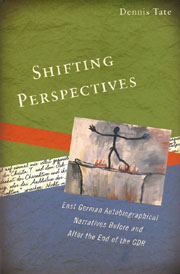Book contents
- Frontmatter
- Contents
- Acknowledgments
- List of Abbreviations
- Introduction: East German Autobiographical Narratives: Challenging Conventional Genre Distinctions
- Part 1 Historical Overview
- Part 2 Case Studies in Autobiographical Writing
- 2 Brigitte Reimann: The Constraints of First-Person Fiction
- 3 Franz Fühmann: The Deconstruction of an “Exemplary” Biography
- 4 Stefan Heym: Strategies of Self-Concealment in Fictional and Autobiographical Mode
- 5 Günter de Bruyn: From the ”Lies” of Fiction to the “Truth” of Autobiography?
- 6 Christa Wolf: “Subjective Authenticity” in Practice: An Evolving Autobiographical Project
- Bibliography
- Index
5 - Günter de Bruyn: From the ”Lies” of Fiction to the “Truth” of Autobiography?
from Part 2 - Case Studies in Autobiographical Writing
Published online by Cambridge University Press: 05 February 2013
- Frontmatter
- Contents
- Acknowledgments
- List of Abbreviations
- Introduction: East German Autobiographical Narratives: Challenging Conventional Genre Distinctions
- Part 1 Historical Overview
- Part 2 Case Studies in Autobiographical Writing
- 2 Brigitte Reimann: The Constraints of First-Person Fiction
- 3 Franz Fühmann: The Deconstruction of an “Exemplary” Biography
- 4 Stefan Heym: Strategies of Self-Concealment in Fictional and Autobiographical Mode
- 5 Günter de Bruyn: From the ”Lies” of Fiction to the “Truth” of Autobiography?
- 6 Christa Wolf: “Subjective Authenticity” in Practice: An Evolving Autobiographical Project
- Bibliography
- Index
Summary
De Bruyn as the Exception: A Postunification Success Story
SINCE THE COLLAPSE OF THE GDR, Günter de Bruyn's literary standing has grown in a way that sets him apart from the other East German authors of his generation. The dramatic change in his fortunes in unified Germany is attributable to various factors. Primarily, of course, it reflects the strong impact that his two-volume autobiography, Zwischenbilanz (1992) and Vierzig Jahre (1996), has made both in the cultural media and among the general readership, a rare case of critical praise being accompanied by widespread public interest. De Bruyn has also enjoyed a moral bonus resulting from the open and self-critical manner in which he dealt with the fallout from his Stasi files and the other archive material that exposed the extent of the collaboration between authors in general and the SED regime, however modest these “revelations” may have been in de Bruyn's case.
There is, however, another, less obvious, reason for this remarkable growth in respect for his literary abilities, which was a potential source of embarrassment to the cultural opinion-makers of the new Germany in the early 1990s: the fact that, before 1989, his achievements as an essayist and a creative writer were significantly underplayed in comparison to those of his GDR contemporaries (Christa Wolf is an obvious example) who, in turn, experienced much greater difficulty in reestablishing themselves in the cultural context of unified Germany.
- Type
- Chapter
- Information
- Shifting PerspectivesEast German Autobiographical Narratives before and after the End of the GDR, pp. 159 - 193Publisher: Boydell & BrewerPrint publication year: 2007



